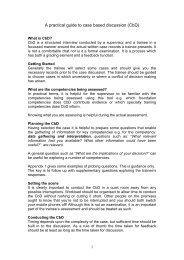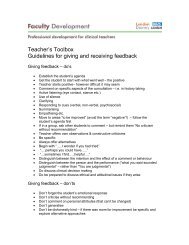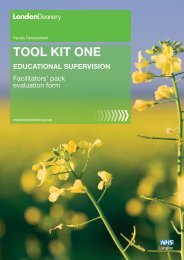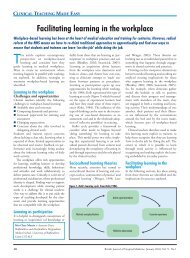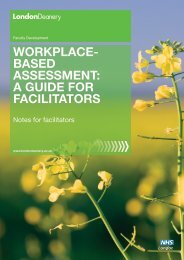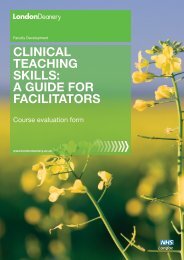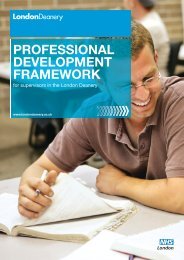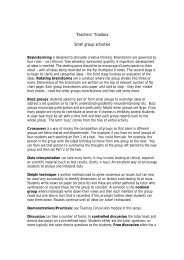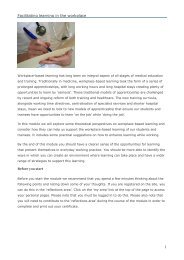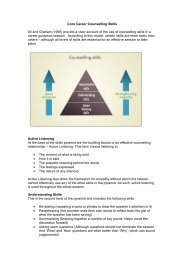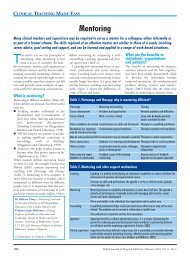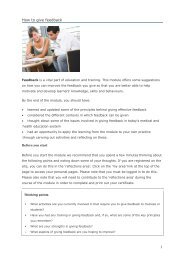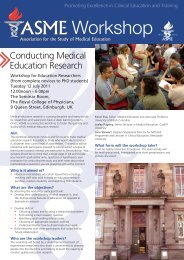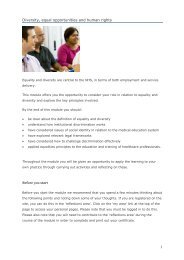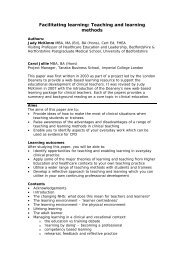Curriculum development module - Faculty Development - London ...
Curriculum development module - Faculty Development - London ...
Curriculum development module - Faculty Development - London ...
You also want an ePaper? Increase the reach of your titles
YUMPU automatically turns print PDFs into web optimized ePapers that Google loves.
Methods of monitoring curriculum implementation<br />
Observation – this is particularly valuable in the early stages of implementing a<br />
course but should be carried out separately from observations of teacher<br />
performance. The teaching and learning process can be observed in a variety of<br />
settings and forms can be used to record the information in a standardised way.<br />
This is a time-consuming method of monitoring and can be subject to observer<br />
bias.<br />
Feedback questionnaires – questionnaires can be used to collect information<br />
from staff, students and external people or groups involved with the course.<br />
Information ca be sought about all aspects of a course. Questionnaires are useful<br />
to collect a large amount of information and, if both open and close questions are<br />
used, can be a rich source of data. Response rates can be low and care must be<br />
taken not to overload people with questionnaires and also to seek out ways in<br />
which responses can be encouraged eg. handing out questionnaires at the end of<br />
teaching sessions and giving time for students to complete these. It is usual<br />
practice for questionnaires to be completed anonymously.<br />
Focus groups/meetings/fora/interviews – structured or semi-structured<br />
meetings (with individuals or groups) and focus groups can be another useful<br />
source of detailed information about a programme. These are time consuming and<br />
therefore are best used to probe into areas of concern or to follow up issues which<br />
have been identified through other means eg. questionnaires. It is good practice<br />
to set up regular meetings with student and staff representatives aimed<br />
specifically at reviewing the course or elements of it. <strong>Curriculum</strong> committees can<br />
also be useful sources of information about the course and help to increase<br />
ownership of the curriculum. The results from such meetings must be fed back<br />
into the overall quality assurance mechanisms so that appropriate action can be<br />
taken.<br />
Student assessment results – Results from both formative and summative<br />
assessments should be analysed regularly in order to evaluate whether individual<br />
assessments are performing reliably and validly and also whether minimum set<br />
standards are being achieved. The reports from external examiners are also a<br />
very useful source of external information about the course.<br />
Reports – reports which the institution has to provide for internal use (eg.<br />
absence statistics) or external agencies can be useful sources of information<br />
about the programme.<br />
Evaluation is a system of feedback, providing information to planners,<br />
teachers/trainers, students, parents and decision-makers. Evaluation is a process<br />
involving ongoing activities aimed at gathering timely information about the<br />
quality of a programme.<br />
Why do we need to evaluate our courses?<br />
• To identify successes and failures of the curriculum with a view to<br />
correcting deficiencies<br />
• To measure if stated objectives have been achieved



